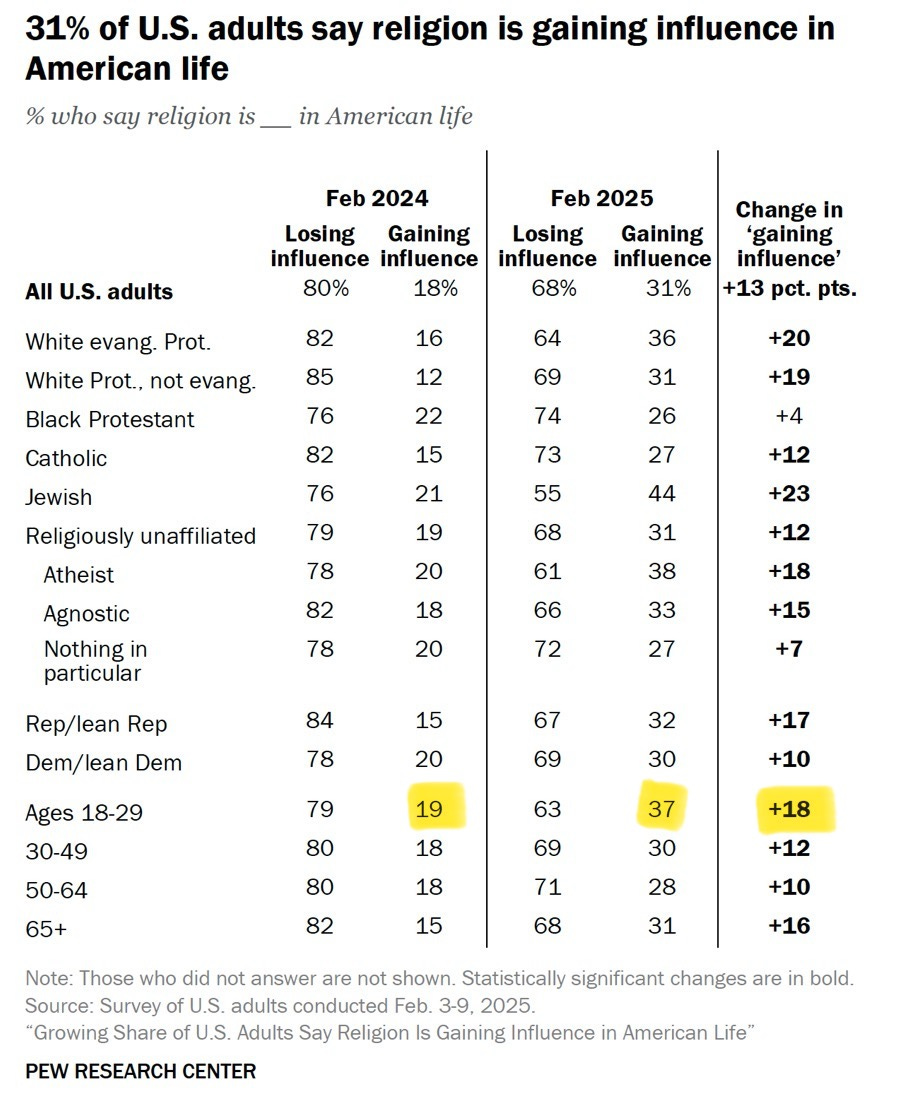Twice as many young people say religion is gaining influence in American life
Plus: Gen Zers not using AI see it holding them back, a push for chatbot age verification, and passive news consumers.
Hot priest influencers. Bible verses in Instagram bios. Pope-Tok. It’s not your imagination, young Americans are rethinking religion.
The numbers: 37% of young Americans ages 18-29 say religion is gaining influence in American life, according to Pew Research Center. That’s nearly double the share from last year, when just 19% of young Americans under 30 said the same.
Meanwhile, the number of young Americans who say religion is losing influence has dropped 16 points.
This shift crosses political and denominational lines. Democrats and Republicans alike, every age group, every faith community… they’re all seeing religion’s role in public life expand.
Nearly 60% of Americans have a positive view of religion, while 20% have a negative view.
Among young adults, 46% have a positive view of religion, while 29% have a negative view. 25% of young adults have a neutral view.
The Up and Up’s take: The caricature of religious youth — the MAGA-hat wearing, conservative podcast-listening young man chasing traditional values — only tells part of the story.
What’s emerging is a new spiritual middle ground that’s driven by disillusionment, if not dogma. Gen Z isn’t necessarily going back to church on Sunday, but they’re reclaiming the language of religion and faith, this time on their own terms with sermons on TikTok, therapy-style confessions on podcasts, and Bible study groups that double as brunch.
Even though the public image of religious Gen Zers tends to focus on one archetype, in recent listening sessions and 1:1 conversations with members of Gen Z, I’ve heard young women, young people of color, and religious minorities emphasize the role that faith plays in their life. In reality, faith plays an important role across a much broader and more diverse set of young people.
Why? Gen Z is lonely. They’re morally exhausted and want community. And they’re searching for for IRL spaces to come together (you may hear this called a quest for “the third space”). For both the newly and always religious Gen Z, faith is an answer to their uncertainty, while offering a sense of relief.
This also applies to Gen Z’s obsession with Co-Star, birth charts, and tarot cards. Gen Z’s fixation with astrology stems from the same impulse driving their renewed interest in faith — a craving for belonging and explanation. When institutions feel shaky and algorithms decide what we see, the stars offer a fixed and ancient alternative. Astrology can give young people a framework for meaning.
Gen Z has come of age in chaos (a pandemic, political extremism, economic instability and rising costs, etc.) that makes basic milestones feel out of reach, on top of a digital culture that rewards outrage. In that context, religion or spirituality becomes an anchor, or a way to opt out of nihilism.
Other news…
Students who don’t use AI are more likely to see it holding them back
A group of senators wants to require age verification for AI chatbots
Noteworthy reads
Why young women are getting facelifts, Kate McCusker for The Guardian
UNC Chancelor Lee Roberts on pushing his university into the AI age, Karyne Levy/Connie Loizos for TechCrunch
Can Gen Z Get Rid of Its Phones? Elias Wachtel for The Atlantic
It’s PR, not the ER: Gen Z is resisting the workplace emergency, Rainseford Stauffer for The Washington Post



Thank you so much for talking about this.
This seems like the tip of an iceberg - my curiosity is exploding! Thank you for writing about it. 🙏🏽💜